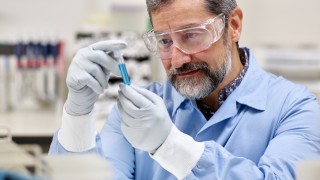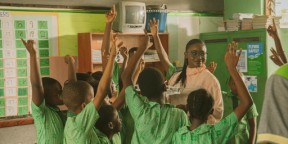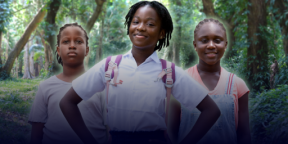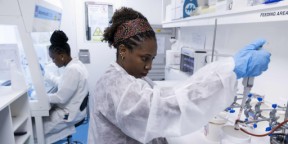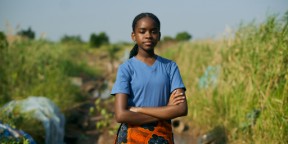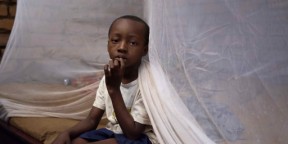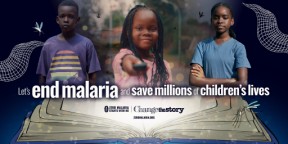Proportion of global malaria R&D funding halved since Covid-19
- Over $100m fall in malaria research and development funding since Covid-19
- Malaria cases and deaths remain above pre-pandemic levels with case incidence and mortality targets off track by 55% and 53% respectively
- The UK, however, remains consistently the second-highest funder of global malaria R&D since 2007
- We're calling on government to continue leadership and grab this “golden opportunity” to significantly reduce malaria using new British-backed innovations
The proportion of global research and development funding dedicated to malaria fell by $103m; from $707m in 2019 to $604m in 2022, according to new research by Oxford Economics Africa (part of the Oxford Economics Group) commissioned by Malaria No More UK for World Malaria Day.
This represents a drop from 12% to 6% as a share of all global R&D funding for neglected diseases, emerging infectious diseases, and sexual and reproductive health. This is also a fall of over $150m from a peak in 2018, shortly before the Covid-19 pandemic, of $756m.
Meanwhile, malaria cases rose during the Covid-19 pandemic to 249m in 2022; the highest number in nearly 20 years, and deaths also rose during this period to 608,000. The Sustainable Development Goal (SDG) to reduce the malaria case incidence and mortality rates by at least 90% by 2030 is currently off track by 55% and 53% respectively.
This comes ahead of critical funding moments in 2024, including a ‘fundraising replenishment’ from The Global Fund to Fight Aids, Tuberculosis and Malaria - the largest fundraising organisation for these diseases. This also represents the first replenishment since the Covid-19 pandemic was officially declared over by the World Health Organization in May 2023.
Gavi, The Vaccine Alliance, is also defining its investment strategy for 2026-2030 this year, the first with two effective malaria vaccines available, which will inform its investment case and how much money it receives from donors.
The UK, including the government and non-government funding and research institutions, has consistently been the second highest country funder of malaria R&D since 2007 after the US, providing an average of 9% of global funding. This funding has helped support the development of two malaria vaccinations by British science institutions, alongside interventions like next-generation bed nets.
We're calling on the UK government and governments around the world to provide the funding required for The Global Fund and Gavi to ensure these new interventions reach the children that need them, as well as continuing to develop new innovations to defeat malaria.
Quotes
Gareth Jenkins, Executive Director of Advocacy and Strategy at Malaria No More UK, said: “The UK science superpower has helped to spearhead game-changing innovations like vaccines and next-generation bed nets. The government in the UK and those around the world now have a golden opportunity to get these new tools to the children that desperately need them by providing sufficient funding to The Global Fund and Gavi.
“Alongside this, following the global cuts to R&D funding during the Covid-19 pandemic, governments, research institutions and funding organisations must keep their foot on the accelerator to continue fostering novel interventions and treatments to maintain a robust malaria pipeline for the future.
“If we don’t, this disease can thrive again and claim the lives of even more children despite solutions being available. But if we do, we have a historic opportunity to significantly reduce malaria and free up resources to secure the world against pandemics and climate change, benefitting people in the UK as well.”
Earlier this year Cameroon became the first country to launch RTS,S, the world’s first malaria vaccine for use in endemic countries, following the Malaria Vaccine Implementation Programme (MVIP) studies in Ghana, Kenya and Malawi, implemented by Ministries of Health and coordinated by WHO and funded by Gavi, the Vaccine Alliance, the Global Fund to Fight AIDS, Tuberculosis and Malaria, and Unitaid. This programme has seen the vaccine administered to more than 2 million children since 2019.
Thomas Breuer, GSK Chief Global Health Officer, said: “The launch of RTS,S the world’s first malaria vaccine for use in endemic countries, underscores how vital partnership and collaboration is in the global effort to achieve the 2030 SDG of reducing the number of cases and deaths caused by malaria. However, the toolbox of malaria vaccines and medicines needs further upgrades, as current tools will not be enough to conquer malaria. GSK will continue to invest in innovation and R&D to improve malaria prevention and treatment in children and vulnerable populations to support global elimination.”
Sylvie Fonteilles Drabek, Interim CEO for Medicines for Malaria Venture, said: “We believe we can beat malaria in our lifetimes. Current innovations in preventing and curing the disease will prove essential in this fight. But, as this research shows, global health is affected by external shocks (such as the Covid-19 pandemic), which can significantly hinder progress.
“This is why we must maintain momentum in striving to achieve the SDG target related to malaria by continuing to invest in R&D for new and more effective innovations, as well as ensuring that these interventions get from labs to those who need them. Medicines for Malaria Venture will continue to work with its partners to bring forward antimalarials that protect and cure the world’s most underserved populations, and enhance control and elimination efforts to ultimately achieve eradication.”
The World Health Organization estimate that malaria interventions have contributed to the prevention of 2.1bn cases and 11.7m deaths between 2000 to 2022, and that 191m cases and 991,000 deaths were averted in 2022 alone.
The success of the malaria vaccines and other new tools, including next-generation bed nets, is dependent on The Global Fund and Gavi generating the money they need to manufacture and distribute them in sufficient quantities.
Malaria vaccine efficacy is also often dependent on usage with other tools, such as seasonal malaria chemoprevention and bed nets, as the vaccines only provide partial protection by themselves. Continued rollout of such tools is therefore critical for vaccines to work (See ‘Notes to editors’ for case studies demonstrating examples of cutting-edge malaria R&D).
ENDS
Notes to editors
For further information please contact louie.freeman-bassett@malarianomore.org.uk / 07748102192 or Kate Pattison, Head of Communications at Malaria No More UK - kate.pattison@malarianomore.org.uk
FULL RESEARCH
Sources
- Research and analysis conducted by Oxford Economics Africa (part of the Oxford Economics Group) on behalf of Malaria No More UK
- Case and mortality data, ‘The World Malaria Report’, The World Health Organization, 2023, https://www.who.int/teams/global-malaria-programme/reports/world-malaria-report-2023
- Research and development data, ‘G-Finder Data Portal: Tracking Funding for neglected disease, emerging infectious disease, and sexual and reproductive health’, Policy Cures Research, 2007-2022,https://gfinderdata.policycuresresearch.org/pages/data-visualisations
- The G-FINDER is conducted by Policy Cures Research, a not-for-profit global health think tank based in Sydney, and tracks annual investment into R&D for new products and technologies to address priority global health challenges. This includes funding for basic research and the development of new drugs, vaccines, diagnostics and other tools for global health priorities that disproportionately affect people in low- and middle-income countries, such as neglected diseases, emerging infectious diseases, and sexual & reproductive health issues. https://gfinderdata.policycuresresearch.org/pages/static/introduction
- Details of the World Health Organization’s malaria vaccine rollout, ‘Malaria vaccine Q&A’, World Health Organization, 2024, https://www.who.int/news-room/questions-and-answers/item/q-a-on-rts-s-malaria-vaccine
Data and additional information
- Alongside R&D, control and elimination funding is the other significant stream needed to combat and end malaria. Control and elimination focus on deploying programmes against malaria, whereas R&D focus on producing new technologies to do so.
- Funding for malaria R&D fell from 12% in 2019 ($707m) to 6% in 2022 ($604m) across emerging disease, emerging infectious disease and sexual health categories. Data on country funding includes both government and country-based institutional funders (G-Finder Data Portal).
- The global estimated number of malaria cases in 2022 was 249m; a rise from 233m in 2019 and a slight fall from 243m in 2000. The global estimated number of malaria deaths in 2022 was 608,000; a rise from 576,000 in 2019 though a fall from 631,000 in 2020 and a significant fall from 864,000 in 2000 (p.8 The World Malaria Report, The World Health Organization, 2023).
- Children represented 76% of global malaria deaths in 2022 (The Word Malaria Report, The World Health Organization, 2023).
- A malaria case incidence of 58 cases per 1000 population at risk in 2022 (instead of the expected 26 cases per 1000) means that, globally, we are now off track by 55% (i.e. the level of morbidity for 2022 required to meet the GTS 2025 target is 55% lower than the current case incidence). At the current trajectory, by 2030 the world could be off track by 89%. (p.72, World Malaria Report, The World Health Organization, 2023).
- Malaria deaths per 100 000 population at risk decreased from 15 in 2015 to 14.3 in 2022. Globally, the world is off track by 53%; if this trajectory continues, by 2030 it will be off track by 88%. (p.72, World Malaria Report, The World Health Organization, 2023).
Case studies of innovative and impactful malaria R&D
Case study 1: RTS,S / AS01 Malaria vaccine
During more than 35 years, GSK, in partnership with many organisations including PATH, researched and developed the malaria vaccine, RTS,S/AS01, the first vaccine to help protect children against the deadliest form of malaria, P. falciparum, licensed for use in endemic countries.
As part of the Phase III trial conducted with African research partners at 11 research centres in 7 sub-Saharan African countries, we worked closely with African research centres and supported in-country research capacity. The involvement of African research partners has been important for countries’ evidenced-based decision making for the introduction and implementation of the vaccine.
The vaccine was recommended for use by WHO in 2021 after Malaria Vaccine Implementation Programme (MVIP) studies in Ghana, Kenya and Malawi and has been shown to be well tolerated in severe malaria and a fall in child death. Since 2019, Ghana, Kenya and Malawi have been delivering the malaria vaccine through the MVIP, implemented by Ministries of Health and coordinated by WHO and funded by Gavi, the Vaccine Alliance, the Global Fund to Fight AIDS, Tuberculosis and Malaria, and Unitaid.
The RTS,S/AS01 vaccine has been administered to more than 2 million children in Ghana, Kenya and Malawi since 2019. Today the vaccine is prequalified by WHO, a prerequisite for financing and procurement by UN agencies such as Gavi and UNICEF. The introduction of Gavi funded doses of the vaccine began in January and February 2023 with vaccination programme launches in Cameroon and Burkina Faso.
We worked with MedAccess (a British social enterprise funded by British International Investment and the UK’s Foreign, Commonwealth & Development Office) and Gavi to develop a new innovative finance instrument to manage risk and allow for the on-going manufacture of RTS,S. This was needed because of the long time-lag between when GSK anticipated finished producing doses for the MVIP pilots, and the uncertainty around if and when the vaccine would be introduced to Gavi programmes. This de-risking tool could be adapted for other vaccines going forward.
To ensure longer term sustainable and affordable supply and reach even more children in malaria endemic areas, a tech transfer is underway with Bharat Biotech of India. The acceleration of this tech transfer will increase supply of the vaccine, with GSK continuing to supply the AS01 adjuvant to Bharat. This tech transfer illustrates our model of sharing the responsibility of bringing innovative medicines and vaccines to patients.
